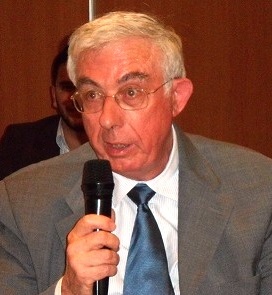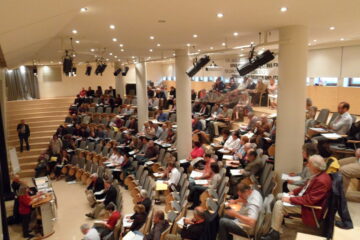
Good morning everybody. I’m Roger Lepeix from the National Federation of French Free Thought where I’m in charge of the general organization as National Administrative Secretary. I’m also a member of the International Council of the AILP/IAFT (International Association of Free Thought) and treasurer of IHEU (International Humanist and Ethical Union).
I know the Lebanon a little bit since I was a teacher here for two years between 1969 and 1971 at the Mathematic Research Center on Damascus Road, near the Museum. I came back in 1998 and 2010. During my latest trip I discussed with my friend George Saad and some others the opportunity of a public symposium on society questions and secularism.

In this country like in many others there is a longing for institutional secularism through the establishment of a genuine civilian society based on the equal rights for all. Free Thought has a long experience on these questions in France as well as at the international level. You know that in France a law, passed in 1905, has separated Churches from State. It seems obvious to us to come and inform you on this historical step forward sometimes challenged even if the Lebanese way to separation between Churches and State will be by definition different. We have not come as sermonizers or post-colonialists but to help you to find your own way.
In France it was not easy to have the 1905 law passed. It was made possible thanks to a large international campaign which relied on strong and well established organizations which led the battle.
Even if it is real the will to institute secularism which emerges from time to time in the Lebanon doesn’t rely on such strong and powerful organizations at the national and international levels yet. This is a major question I would like to tackle now.
First of all I would like to say that this work to build strong organizations able to fight for secularism here in the Lebanon is first thing the Lebanese’s business. This is what this symposium is actually meant for. It gathers various participants and it should result in the setting up of a gathering in charge of leading the fight for secularism in the Lebanon. There is no and there won’t be any recipe. You will have to work out a strategy, to take into account the forces at stake, to rely on some of them and to distrust others. This is your fight. We are here to help you to carry it on but not to carry it on for you.
To reach that goal you’ll have to take history and past battles, won or lost, into account, to take advantage of the others’ experiences and avoid, if possible, to make the well-known mistakes again. On that point the French Free Thinkers and the ones of AILP can bring you information and help you to have a better knowledge of the international scene.
Let’s focus on some definitions. First of all the major difference between secularism and atheism:
- Secularism is a constitutional principle which, through the separation of Churches from State, bans any official religion or ideology and thus allows the freedom of conscience and equal rights for the citizens. This is a collective claim or asset. The individual aspect is to be found in the fact that each individual agrees or not to defend or claim this institutional asset.
- On the contrary atheism is first of all an individual opinion which claims that there is no God to watch us and rule our lives.
How can they be reconciled??
- At the individual level: no problem: we can be an atheist and claim the separation between Church and State. We can defend both secularism and atheism. Some of us may well illustrate this.
- It can’t be done at the institutional level. A state can’t be both secular and atheist. If it is atheist there is obviously an official ideology which goes against secularism. In addition the fact that an official ideology exists always leads to inequality in citizens’ rights.
- The main danger is to see secular people organize in a specific community parallel to religions. This is to be found in many countries. This is an additional obstacle in the fight for secularism. Not only is the communitarian system reinforced by this additional community but also clannish atheists are diverted from the fight for secularism.
I strongly advise you to thoroughly discuss these questions to avoid creating obstacles in your fight for secularism.
Another aspect must be made clear: to define what a secular organization is. Is it a non- religious organization? Or is it an organization which fights for secularism? This is not the same thing. A non-religious organization can have any goal such as organize sports events, concerts or travel. If it doesn’t have a policy to defend secularism it can voluntarily or not favor clannishness. This is especially the case for atheist organizations as I’ve just said.
Another key point prior to the defense of secularism: the defense of the freedom of conscience and speech. You can’t defend secularism if you don’t defend at the same time the freedom of speech for all, including the ones whose ideas we don’t share. This is a key point which doesn’t always go without saying. The greatest democrats are sometimes tempted to prevent the ones they consider as dangerous for democracy from expressing themselves.
Yet democracy is never defended when the right of speech is limited. The freedom of speech for all in the respect of public order that is to say not assaulting people is absolutely necessary in the defense of secularism which is the basis of equal rights.
We have focused on some basic definitions. Now what about the current secular associative scene at the international level?
I’ll mention for the record that the defense of secularism can be found in the programs of some trade unions and political parties. At the international level they are not (or no longer) first rank players in the questions discussed today even if various situations are to be found at the national levels. As for the Lebanon you are better informed than I am.
Free Thought used to be an inescapable player in the campaigns for the separation between Churches and State. As early as 1880 it was organized in an International Association and it played a major role when the French law of separation was passed since the President of the Parliamentary Commission and the reporter of the bill were both leaders of Free Thought. This battle is rooted in two major Free Thought international congresses in Rome in 1904 and Paris in 1905. These international congresses gathered thousands of representatives from all continents.
The international organization of Free Thinkers unfortunately deeply suffered in the 20th century especially during WWI and WWII. An international organization of Free Thought was very recently reforged on August 10th 2011 in Oslo. It is based on the works of the International Liaison Committee of Atheists and Free Thinkers founded in 2005 in Paris.
AILP elected in Oslo 6 spokesmen, among them David Rand and Christian Eyschen and an International Committee Georges Saad and I belong to. AILP/IAFT co-organizes this symposium in the frame of its campaign for the separation between Churches and States all over the world. AILP/IAFT has also launched two other international campaigns: one against the public funding of religion and the second to denounce the perversions of priests and other clerics, perversions you have certainly heard of. Besides AILP/IAFT is preparing a Congress of Americas which should take place before the end of the year.
Another major international secular organization is IHEU (International Humanist and Ethical Union) founded in 1952 in Amsterdam. I’m a member of its executive committee as a treasurer. IHEU gathers a hundred of organizations from 40 countries. AILP/IAFT main organizations are members of IHEU which gathers in fact basically humanist, skeptic, atheist, rationalist…organizations. This is a widely open organization, an umbrella so to speak which defends human rights, rationalism and the freedom of speech. They organize an international congress every three years. During the 2005 Paris Congress, organized by the French Free Thought the resolution to claim the separation between Churches and States all over the world was unanimously voted.
Nevertheless the organizations gathered in IHEU don’t all endorse the Free Thinkers’ definite position on the question of secularism defense.
For the time being there is a rather tacit agreement between AILP/IAFT and IHEU to try to cooperate and to, at least, gather their executive committees in a coordinate way.
A new organization has emerged for some months: AAI Atheist Alliance International. It was born the fact that organized atheism has developed in the US in the American Atheist organization. A dissidence has founded Atheist Alliance which has made contacts mainly in Europe. The non-American organizations gathered in AAI last June in Dublin. Actually this organization, Atheist Alliance America is formally a member, is rather a liaison committee which works basically through the Internet and which organizes each year a regional gathering. This year it took place in Melbourne, Australia where President Tanya Smith comes from. They have relationships with both AILP/IAFT and IHEU. I made a statement in June at the Dublin meeting in the name of AILP/IAFT to suggest cooperation. Tanya Smith was in Oslo in August for the AILP/IAFT launching congress. We expect this cooperation to be fruitful. While having lunch with Tanya Smith in Paris some months ago we noticed some major convergences between our organizations.
I will mention only three international gatherings. There are some more even at the international level but they focus on more limited activities: book sale, university cooperation etc…. Thus they are not directly or fully a matter for the global fight for secularism.
As a conclusion I would like to come back on how an organization should be built and how to make a good job for secularism. First the international dimension is absolutely necessary since the battles are carried out at that level even if it has a national dimension. It takes national internationally linked organizations. Both aspects are complementary. Then independent organizations must be built step by step. They must be able to decide what they wish to do. As a Brazilian proverb says: “The one who pays the orchestra chooses the music”. Beware of the organizations which depend on a university or which rely too much on the Internet. The Internet is a very useful tool and must be widely used. But make sure you don’t depend on it when it comes to daily work and expression. In a period of crisis the Internet can easily be cut. The organizations with a real impact will be the ones which have an independent system: decision making, meetings on a regular basis, paper medium for propaganda, statements, information, invitations, financial autonomy etc….
I can thus but advise you all to get organized that way if you want secularism to move forward in the Lebanon. Today’s symposium has definitely allowed an exchange between neighboring or even opposite positions. It will be successful if it allows creating a gathering, a liaison committee or anything else which will be able to organize and coordinate the battle for secularism in the Lebanon. We are more than ready to help you. To reach that goal you must decide to create the structure to defend secularism here in the Lebanon and this structure must be linked to the existing international organizations which fight for the same cause whatever the way you build this structure. This is the reason why I have introduced these international structures.
Thank you.
